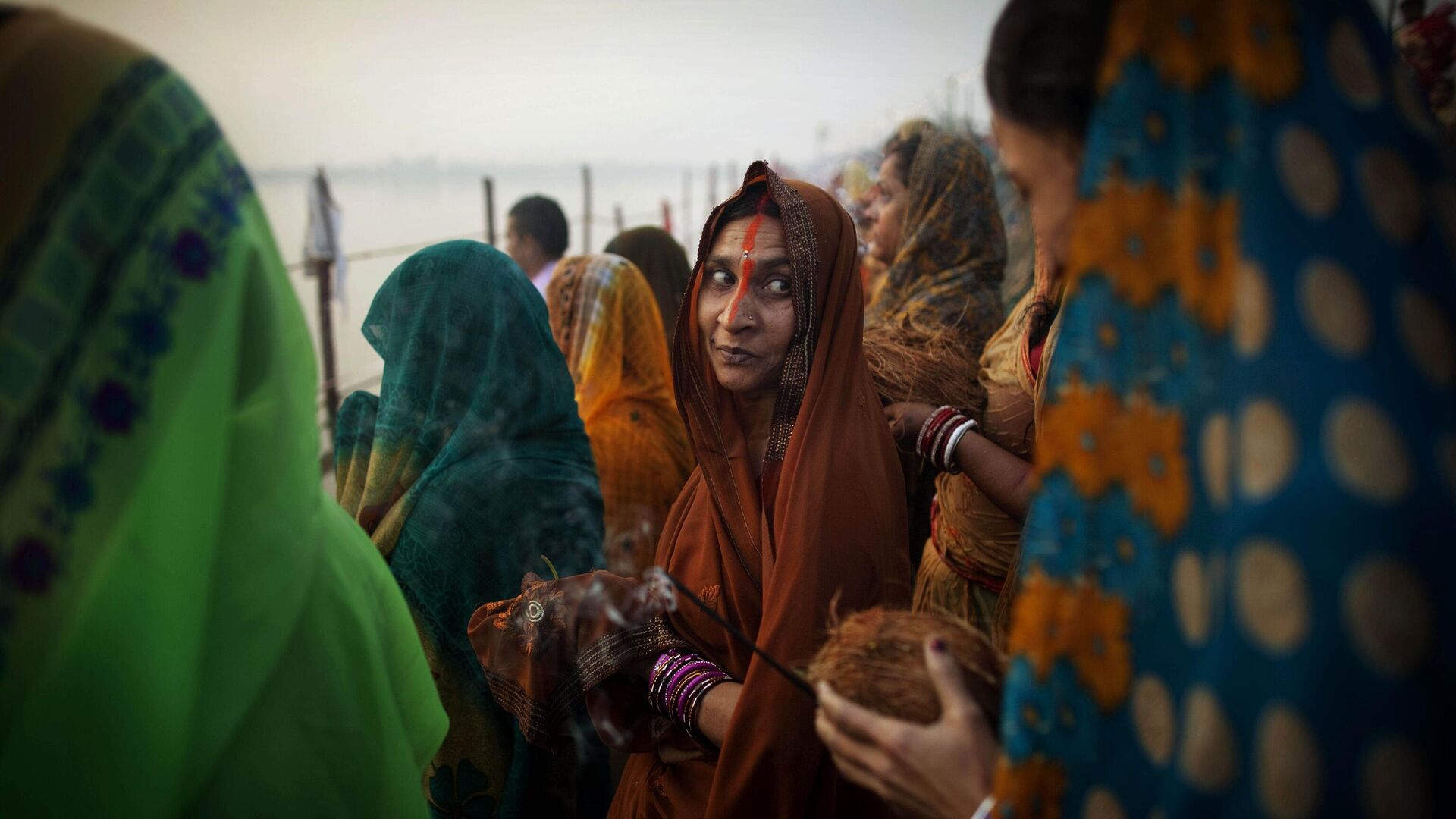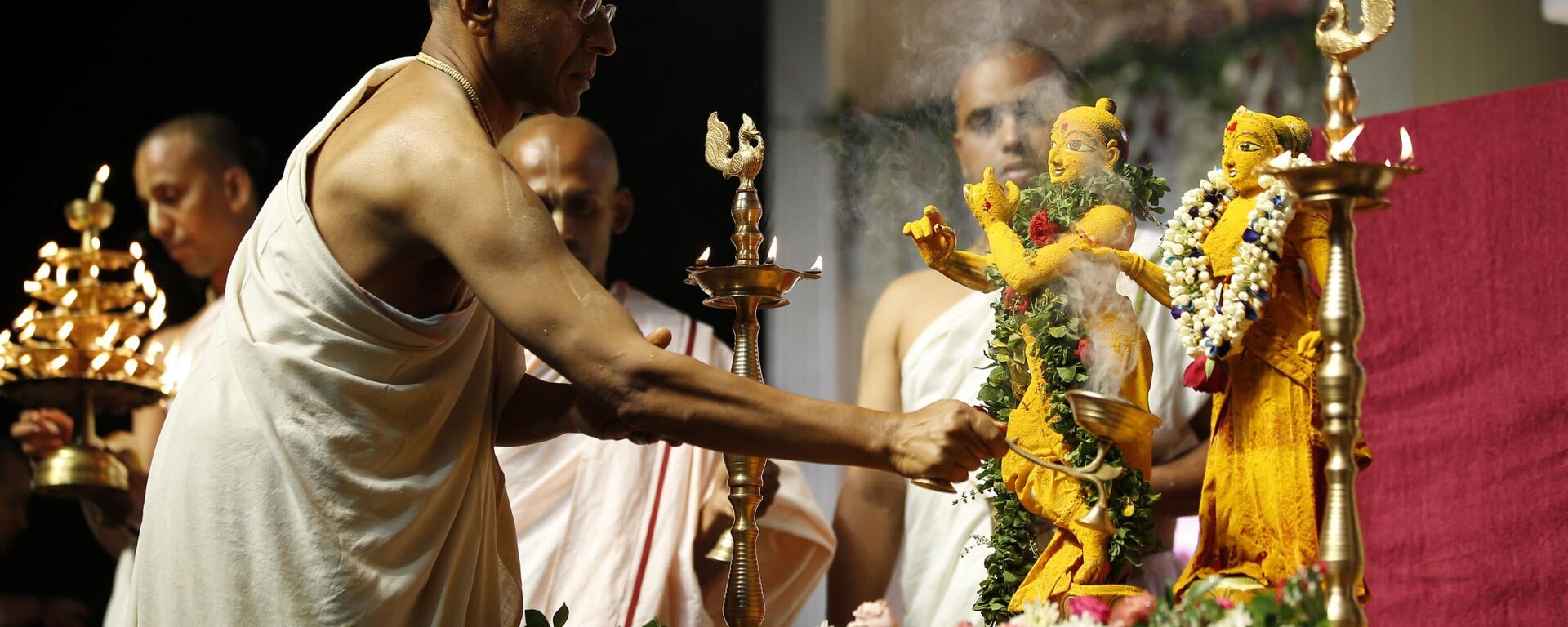https://sputniknews.in/20231030/why-indian-women-find-it-hard-to-fully-enjoy-festivals-5127968.html
Why Indian Women Find It Hard to Fully Enjoy Festivals
Why Indian Women Find It Hard to Fully Enjoy Festivals
Sputnik India
As India is witnessing a month full of festivities, Indian women will be unusually busy and excited to have this much awaited break. Here is how they wish to spend it.
2023-10-30T13:53+0530
2023-10-30T13:53+0530
2023-10-30T16:43+0530
sputnik exclusives
haryana
india
aging society
social uplifment
delhi commission for women (dcw)
violence against women
women empowerment
women's rights
women's reservation
https://cdn1.img.sputniknews.in/img/07e6/0c/13/149534_0:0:3072:1728_1920x0_80_0_0_2c147cc91f7bdad8447df557d145327e.jpg
It's festival time in India. And literally anyone and everyone with a good job or business is welcoming this festive occasion with great delight.But for many women, it’s set to be a completely different sort of pause in life. From leading a lifestyle that keeps them occupied in a host of roles, it's a time for them to take a break.But how do they live it? How do they view festive time inside their heart? Do they really succeed to get the joy they longed for? Sputnik India tried to explore that from women belonging to different social strata of life.Joy of Being with Loved OnesBeing a pilot in an airline my industry doesn’t allow me to have all those privileges that other professions allow where one can celebrate Diwali, Eid or any other festival without planning, Hana Khan, well-known as ‘Girl Pilot’ on social media, shared with Sputnik India.Hana says when she thinks of Eid, or other festivals, she thinks of food, preparing dishes. "I think of feeding people, calling friends home. And then we have some rituals where families sit together, where we prepare for the eve-feast for the next day.""When all of us are all sitting and cutting dry fruits and all of that. Yeah, that’s what I enjoy the most."Missing Freedom to Enjoy Cultural Side of FestivalsAs per Jagmati Sangwan, a well-known women rights activist from the agricultural state of Haryana, a lot of women are under great stress during the festival time -- preparing something special or cleaning and decorating the entire house before the family begins celebrating.“If the women are urged to join some social or cultural event around Diwali, they say ‘Oh no, not around Diwali’, ‘we have a lot of work to do’,” she shared with Sputnik India.In this region, women at large remain too occupied to sense the occasions for their deeper social message, she stated. “They remain lost in that, hardly finding any time to get involved in the kind of cultural activities to be part of a progressive society.”Jagmati says she is confronted with the challenge of relating the festivals with some progressive ideas that are gender neutral, which are egalitarian ideas. “But we fully understand that before going to that level, we would have to detach these festivals from religiosity.”For Some, Festivities Remain CharmlessFor 40-year-old Meera, festivals hold little meaning. Since her daily-wager husband turned a drunkard, her family survives on alms. During Covid, she had to marry off her 18--year-old daughter.Asked how she would spend Diwali or Bhai Dooj festivals this time, she said: "My main worry is how to arrange food for the day. He (husband) doesn't work regularly and remains lying inside the house as a drunkard. My 15-year-old son has already spoiled himself because of his bad local friends."Explaining her daily struggle, she said: "I come here to beg in front of this temple. And it's not without a bitter fight for your place with other beggars on any given day. Still it's not certain how much I will earn for the day. It can be anywhere between 50 to 150 rupees (around $1.5). Then I have to rush back to handle all household chores. If not me, who else will do it?""...Like last year, I will ask my married daughter to do the Diwali Puja on our behalf this time as well."
https://sputniknews.in/20230907/janmashtami-india-immerses-itself-in-festivities-to-celebrate-birth-of-lord-krishna-4084626.html
haryana
india
new delhi
delhi
Sputnik India
feedback.hindi@sputniknews.com
+74956456601
MIA „Rossiya Segodnya“
2023
Sandeep Datta
https://cdn1.img.sputniknews.in/img/07e7/04/07/1468069_0:258:1800:2058_100x100_80_0_0_3909870b82375b0693e9fd27915facc3.jpg
Sandeep Datta
https://cdn1.img.sputniknews.in/img/07e7/04/07/1468069_0:258:1800:2058_100x100_80_0_0_3909870b82375b0693e9fd27915facc3.jpg
News
en_IN
Sputnik India
feedback.hindi@sputniknews.com
+74956456601
MIA „Rossiya Segodnya“
Sputnik India
feedback.hindi@sputniknews.com
+74956456601
MIA „Rossiya Segodnya“
Sandeep Datta
https://cdn1.img.sputniknews.in/img/07e7/04/07/1468069_0:258:1800:2058_100x100_80_0_0_3909870b82375b0693e9fd27915facc3.jpg
what does the world think of indian women,what foreigners think of indian women,challenges of being a woman in india,sexism in indian culture, challenges of being a woman in india, women's role in indian culture, when national women's day celebrated in india, how women live their life, how women in india enjoy life, why indian families depend on women,what women want, what is indian way of life, how indians celebrate festivals, what professional indian women think of celbrations, how women celelbrate festivals, when is diwali, what is indian culture, what women rights activists think about festivals, why culture is important, why religion is important, how indians celebrate their festivals,
what does the world think of indian women,what foreigners think of indian women,challenges of being a woman in india,sexism in indian culture, challenges of being a woman in india, women's role in indian culture, when national women's day celebrated in india, how women live their life, how women in india enjoy life, why indian families depend on women,what women want, what is indian way of life, how indians celebrate festivals, what professional indian women think of celbrations, how women celelbrate festivals, when is diwali, what is indian culture, what women rights activists think about festivals, why culture is important, why religion is important, how indians celebrate their festivals,
Why Indian Women Find It Hard to Fully Enjoy Festivals
13:53 30.10.2023 (Updated: 16:43 30.10.2023) As India is witnessing a month full of festivities, Indian women will be unusually busy and excited to have this much awaited break. Here is how they wish to spend it.
It's festival time in India. And literally anyone and everyone with a good job or business is welcoming this festive occasion with great delight.
But for many women, it’s set to be a completely different sort of pause in life. From leading a lifestyle that keeps them occupied in a host of roles, it's a time for them to take a break.
But how do they live it? How do they view festive time inside their heart? Do they really succeed to get the joy they longed for?
Sputnik India tried to explore that from women belonging to different social strata of life.
Joy of Being with Loved Ones
Being a pilot in an airline my industry doesn’t allow me to have all those privileges that other professions allow where one can celebrate Diwali, Eid or any other festival without planning, Hana Khan, well-known as ‘Girl Pilot’ on social media, shared with Sputnik India.
Hana says sometimes she gets off, and sometimes she doesn’t. "When I do I make the most of it, depending on when I get a holiday. But if I don't get an off, I’ll have to either celebrate one day before or the day after. And, the same goes for Eid."
Hana says when she
thinks of Eid, or other festivals, she thinks of food, preparing dishes. "I think of feeding people, calling friends home. And then we have some rituals where families sit together, where we prepare for the eve-feast for the next day."
"When all of us are all sitting and cutting dry fruits and all of that. Yeah, that’s what I enjoy the most."
"Generally, I make sure to feed the needy. That’s a part of my life, not dependent on festivals. During festivals, I usually add sweets. In the pandemic, I would make food and distribute. I don’t get time for leisure, especially during festivals,” the journalist-turned-commercial pilot stated.
Missing Freedom to Enjoy Cultural Side of Festivals
As per Jagmati Sangwan, a well-known women rights activist from the agricultural state of Haryana, a lot of women are under great stress during the festival time -- preparing something special or cleaning and decorating the entire house before the family begins celebrating.
“If the women are urged to join some social or cultural
event around Diwali, they say ‘Oh no, not around Diwali’, ‘we have a lot of work to do’,” she shared with Sputnik India.
The social activist opines that traditionally, the festivals and the celebrations were basically attached to the crop season since in India’s northern region it’s been a predominantly agricultural society. But of late the festivals have turned into purely religious events rather than the original cultural celebrations.
In this region, women at large remain too occupied to sense the occasions for their deeper social message, she stated. “They remain lost in that, hardly finding any time to get involved in the kind of cultural activities to be part of a progressive society.”
Jagmati says she is confronted with the challenge of relating the festivals with some progressive ideas that are gender neutral, which are egalitarian ideas. “But we fully understand that before going to that level, we would have to detach these festivals from religiosity.”
For Some, Festivities Remain Charmless
For 40-year-old Meera, festivals hold little meaning. Since her daily-wager husband turned a drunkard, her family survives on alms.
During Covid,
she had to marry off her 18--year-old daughter.
She says today, her five other kids cannot think of buying anything new on festive occasions like others do. They just think of what their mummy will bring for the day.
Asked how she would spend Diwali or Bhai Dooj festivals this time, she said: "My main worry is how to arrange food for the day. He (husband) doesn't work regularly and remains lying inside the house as a drunkard. My 15-year-old son has already spoiled himself because of his bad local friends."
Explaining her daily struggle, she said: "I come here
to beg in front of this temple. And it's not without a bitter fight for your place with other beggars on any given day. Still it's not certain how much I will earn for the day. It can be anywhere between 50 to 150 rupees (around $1.5). Then I have to rush back to handle all household chores. If not me, who else will do it?"
On being asked how she would pass her Diwali day, Meera answered: "Just like any other day..."
"...Like last year, I will ask my married daughter to do the Diwali Puja on our behalf this time as well."



